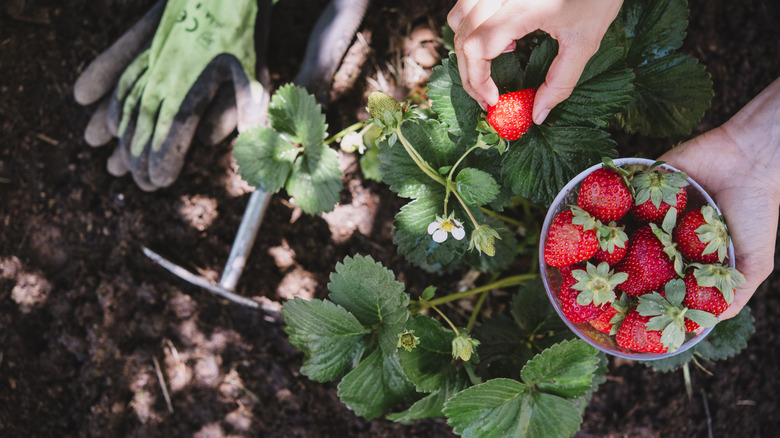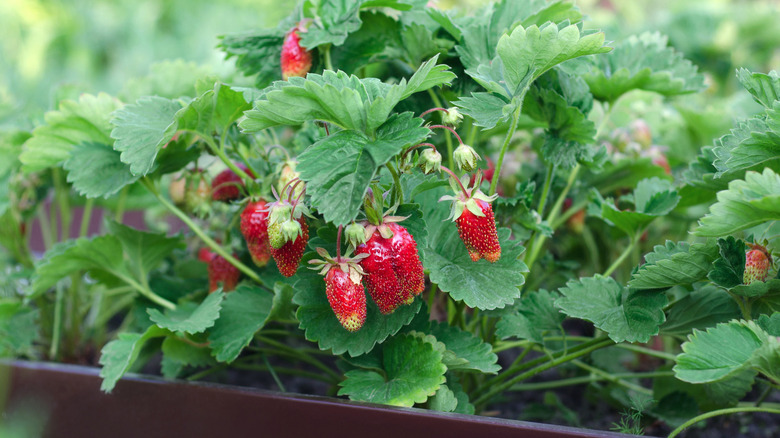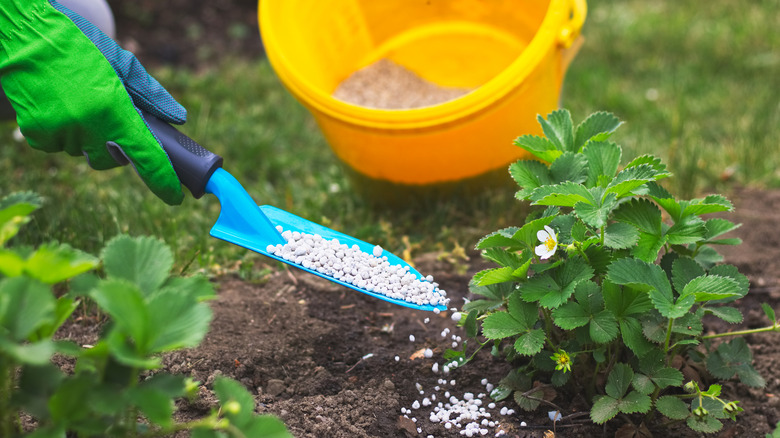Can You Use Tomato Fertilizer On Your Strawberries?
We may receive a commission on purchases made from links.
Strawberries are some of the easiest fruits to grow in your home garden, and there's nothing quite as flavorful as picking those luscious sun-ripened berries from plants you've lovingly grown in the yard. In saying that, strawberries don't need all that much care, especially if you've prepared the soil before planting and ensured it's slightly on the acidic side (the preference for a low pH is one of the reasons blueberry and strawberry plants are excellent garden companions). With these conditions in place, the strawberries will do just fine — as long as you follow this essential tip for watering them. That said, the do require fertilizer, and you might be wondering whether using any fertilizer for fruiting plants will work. For example, some online sources claim that tomato fertilizer is suitable for strawberries.
At a glance, it makes sense. Both strawberries and tomatoes are fruiting plants. This means that while they need nitrogen for growth, they also require adequate quantities of phosphorus and potassium to promote flowering and fruiting. In fact, at the fruiting stage, you want to ensure that the fertilizer you use is higher in the latter two than in nitrogen. However, while tomatoes and strawberries require similar nutrients, their individual needs aren't exactly the same, so tomato fertilizer may not be the best choice to help your strawberries thrive.
What nutrients do strawberries need?
It's always a good idea to get a soil test done before you add any nutrients; this way, you'll know exactly what the soil needs. When first planting the berries, it's recommended that you apply a fertilizer with the nitrogen-phosphorus-potassium (N-P-K) ratio of 5-10-10, or something similar. This translates into adding 5% nitrogen, 10% phosphorus, and 10% potassium. Remember that these ratios are just an example from which we can deduce that strawberries need twice as much phosphorus and potassium as they do nitrogen. However, if you're growing day-neutral varieties, you can use a more balanced feed with a ratio of 10-10-10, because these plants need a consistent supply of primary nutrients for optimum growth.
It gets easier if you're in an area where you can grow strawberries as perennials. You want to avoid a heavy nitrogen application in spring before you've reaped your first harvest, because it will result in excessive leaf growth and soft berries. However, once you've rejuvenated the strawberry plants by cutting back the leaves and removing any runners, using a balanced fertilizer (10-10-10) is perfectly fine. Just remember to water well after feeding your plants, so that you don't end up with salt build-up. You'll also find that strawberries need calcium and magnesium to help with tissue growth and good fruit development, plus an adequate amount of boron. If you've added compost or other organic materials to the soil, boron deficiencies shouldn't be a problem, but only a soil test will be able to confirm this. If you must add boron, be cautious — too much of it can damage the plants.
Analyzing some common tomato fertilizers
Now that we know the basic nutrients that strawberries need, let's examine the nutrient content of some common tomato fertilizers. A popular tomato feed is the Epsoma Organic Tomato-tone. This granular fertilizer contains 3% nitrogen, 4% phosphorus, and 6% potassium, noted on the pack as 3-4-6. This particular NPK breakdown is why this product is so popular — it provides tomato plants with the nutrients they need for optimum fruit production. Also, because tomatoes need calcium to prevent blossom end rot, Tomato-tone contains 8% of this mineral, as well as 0.9% magnesium. Another popular fertilizer for tomatoes, Jobe's Organics Granular Garden Fertilizer, has a similar formulation with an NPK ratio of 2-5-3, plus the addition of calcium and magnesium.
As you can see, these formulations don't exactly match the nutritional needs of strawberries, with Tomato-tone being a little light on phosphorus and the Jobe's fertilizer lacking an adequate amount of potassium. Also, if you're growing day-neutral types, you may want to use a more balanced fertilizer with an equal ratio of nitrogen, phosphorus, and potassium. At the end of the day, if you're new to growing strawberries and want the best possible results, you're better off using a strawberry fertilizer to help your plants thrive. Finally, you might be interested to know if it's better to plant strawberries in the ground or in containers to get the best results.


